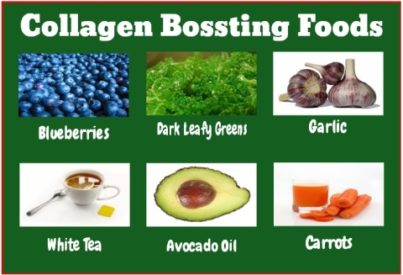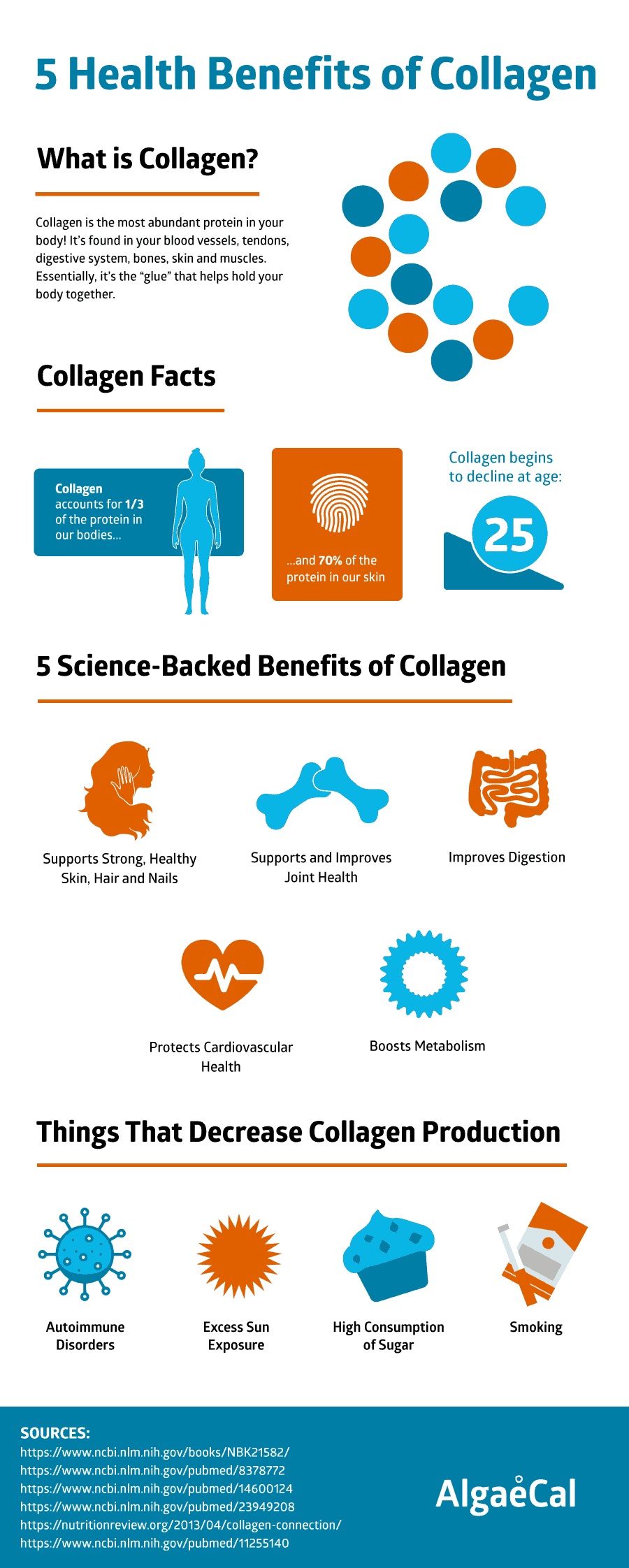You’ve definitely heard the paleo bro types going on about bone broth’s benefits. Maybe you’ve tried it, or (if vegan) rolled your eyes with a big, fat “as if!” attached. The scoop on collagen is it is crucial to keep you balanced, looking fly, and feeling sexy.
If you don’t eat meat or animal products, you can still increase your collagen production. A smart way for vegans to support collagen production is to eat fruits and vegetables plentiful in collagen boosting nutrients.
Collagen is abundant in the body and acts as the vital glue holding our bodies together. With such a vital function, the body prioritizes collagen production. Although collagen production slows as we age, it never stops, and if you supply your body with the proper nutrition to make healthy collagen, the age-related decline isn’t as notable or severe. Of course, getting things like a chemical peel at VCI or other places on the regular means that healthy collagen can grow at a more rapid rate but it also does not hurt to enhance our diets to help this collagen to grow further.
On that note, the following nutrients support collagen production, especially from these top vegetarian food sources:
| Nutrient Name | Top Vegetarian Food Sources | Measurement Amount | Nutrient Amount |
|---|---|---|---|
| Proline (amino acid) | Mustard Seed | 100g | 2800mg |
| Vitamin C (vitamin) | Broccoli Papaya Kiwi Fruit Kale Red Peppers |
100g 100g 100g 100g 100g |
89.2 mg 60.9 mg 92.7 mg 41 mg 128 mg |
| Anthocyanin (flavonoid) | Elderberries Chokeberries Eggplant Black Raspberries Blueberries |
100g 100g 100g 100g 100g |
1993 mg 2147 mg 750 mg 845 mg 529 mg |
| Copper (trace mineral) | Raw Kale Mushrooms, Shiitake Sesame Seeds Cashews Dried Prunes |
100g 100g 100g 100g 100g |
1.5 mg 0.9 mg 4.08 mg 2.22 mg 0.61 mg |
| Lysine (amino acid) | Tofu Kidney Beans Black Beans Tempeh Quinoa |
100g 100g 100g 100g 100g |
450 mg 595 mg 608 mg 905 mg 239 mg |
| Arginine (amino acid) | Tofu Kidney Beans Black Beans Tempeh Quinoa |
100g 100g 100g 100g 100g |
1250 mg 537 mg 549 mg 1250 mg 340 mg |
| Vitamin A (vitamin) | Dried Apricots Cooked Carrots Cooked Kale Butternut Squash, Cooked Sweet Potatoes |
100g 100g 100g 100g 100g |
12669 IU 17033 IU 13621 IU 11155 IU 19218 IU |
| Manganese (trace mineral) | Lima Beans Hazelnuts Pumpkin Seeds Tofu Whole Grain Bread |
100g 100g 100g 100g 100g |
1.3 mg 5.6 mg 4.9 mg 1.2 mg 2.1 mg |
| Zinc (mineral) | Wheat Germ Pumpkin Seeds Cashews Cocoa Powder Cooked Chickpeas |
100g 100g 100g 100g 100g |
16.7 mg 10.3 mg 5.6 mg 6.8 mg 1.5 mg |
- Proline: Proline and hydroxyproline are amino acids that make up 23% of collagen, and have been found to be precursors to sustaining collagen production. Indeed, they play a key role in the stability of collagen. Vegetarian proline sources include asparagus, beans, buckwheat, cabbage, chives, cucumbers, garbanzo beans, peanuts, soy, and watercress.
- Vitamin C: Vitamin C adds a hydroxyl group (-OH) to the amino acids in collagen which allows the acids to turn into a well-formed, strong helix shape. In other words, vitamin C adds oxygen and hydrogen to amino acids so that they can do their part in collagen production. If you don’t get enough vitamin C, your collagen production will slow. Vitamin C is found in abundance in many fruits and vegetables such as broccoli, brussel sprouts, cauliflower, citrus fruits, kale, kiwi, mango, papaya, peppers, pineapple, and strawberries.
- Anthocyanin: One of the prominent features of anthocyanins is its ability to suppress inflammation and stabilize collagen (in rat studies). It does so by preventing free radical damage, which inhibits enzymes from clinging to collagen. Anthocyanins are found in blackberries, blueberries, cherries, and raspberries.
- Copper: Copper has been found to upregulate collagen (especially types I, II and V) and elastin, meaning it increases either the production or utilization of collagen and elastin, as well as helps facilitate creating the fibril structure of these collagens. Copper can be found in vegetarian sources like sunflower seeds, lentils, almonds, apricots, dark chocolate, mushrooms, greens and blackstrap molasses.
- Lysine: Lysine is an essential amino acid, meaning your body can’t make it, so you must get it from foods. Lysine is used in making collagen and protects collagen from enzymatic breakdown. It has also been found to help prevent the loss of bone mineral density, due to its ability to increase intestinal calcium absorption. Lysine is found in meat, poultry, fish, eggs and dairy products. Parmesan cheese contains particularly high amounts of lysine, as does tofu. Vegetarian sources of lysine, in addition to tofu, include brewer’s yeast and spirulina.
- Arginine: or L-arginine is an amino acid made in the body. Some studies have suggested that arginine stimulates insulin-like-growth factor-l (IGF-1) production and collagen synthesis in osteoblast-like cells. Basically, arginine makes the bone cells responsible for making new bone (osteoblasts) more active. Some of the top sources of L-arginine include eggs, sesame seeds, spirulina, coconut meat, cultured yogurt, kefir and raw cheeses.
- Vitamin A: Vitamin A helps stimulate the production of collagen and is only found in animal-derived foods (in its complete, active form called retinol). Fruits and veggies are, on the other hand, are high in phytonutrients called carotenoids (precursors of vitamin A), which the body must then must convert to vitamin A. The best sources of vitamin A are meats including liver, beef, cheeses and egg yolks. Vegetarian sources that are high in beta-carotene, which your body must then convert to vitamin A to utilize, are apricots, broccoli, carrots, kale, squash and sweet potatoes.
- Manganese: Manganese increases production of collagen and elastin by increasing the enzyme responsible for proline formation, especially when healing wounds. Vegetarian food sources of manganese include leafy vegetables, nuts, pineapple, seaweed and other sea vegetables, and whole grains.
- Zinc: Zinc is a cofactor in collagen production, meaning it activates the proteins responsible for making collagen. The richest source of zinc is oysters, but other zinc-rich foods are meat, poultry, fish and dairy products. Vegetarian sources of zinc are predominantly seeds, nuts, and beans.
Collagen and Bone Health
Let’s take a closer look at the link between collagen and your bones. It’s most commonly known that collagen keeps our skin elastic and plump looking, but its benefits go much deeper than that– bone-deep, in fact. Collagen is actually found everywhere in our bodies: our muscles, bones, and skin cells. It’s the most abundant protein in our bodies.
Your bones are made of protein and minerals, and 90% of bone matrix proteins are made of collagen. In fact, the combination of calcium and collagen is responsible for giving our bones strength and flexibility, which helps minimize stress dissolving your bones.
Here’s the frustrating thing though – as we age, our ability to produce collagen diminishes.
Collagen and Calcium Are Essential for Bone Strength
Bone is, after all, a connective tissue. Typically we think of bone as a physical support for the rest of our body, which it is, but it’s also a connective tissue.
Both collagen and calcium are responsible for the strength of your bones. And besides the obvious strength of your bones, there’s another way your bones are strong– they are flexible. Being flexible allows the bone to bend instead of break in many instances, and to absorb an impact rather than fracture. That flexibility is thanks to collagen!
While it’s important to get enough calcium for overall bone health, it’s vital to support healthy collagen production too. All of this becomes even more important if you’ve already developed osteopenia or osteoporosis. And if you add a vegan or vegetarian diet into the mix, you must be even more vigilant.
Lysine and arginine, in particular, are important for bone metabolism and growth, which we discussed above.
Eating foods high in lysine and arginine will help spur on collagen production. So getting both of these amino acids from your diet is a good start. Technically there is no official recommended dosage specifically for lysine or arginine, but we do know the RDA for protein is 0.8 grams per kilogram of body weight. Check out How to Calculate Your Protein Needs to determine what you need.
Whilst there are lysine and arginine supplements out there, we suggest organic whole food sources first – your body will absorb these better, and you’ll get a whole bunch of other nutrients too. The best plant sources of arginine and lysine are listed above in our chart.
What Damages Collagen?
Collagen production declines as we age, however, a healthy diet and lifestyle can significantly mitigate that decline.
Excess sun exposure, chronic high consumption of sugar, and smoking all accelerate collagen decline and actually damage collagen. What’s more, while autoimmune disorders aren’t avoidable, poor management of the condition can hasten the decline in collagen production and damage existing collagen.
Excess Sun Exposure (UV Rays): In an attempt to get that summer glow on your skin, you may be damaging the collagen within your skin that provides the tight, youthful appearance. UV light, both from sun and tanning beds, increases abnormal elastin, which in turn leads to an enzymatic reaction that breaks down collagen. Opt for a little bit of sun as opposed to an hour or more, and stay away from tanning beds for a variety of health purposes.
Chronic High Consumption of Sugar: Excess sugar binds to protein to make something called a glycosylated protein, a molecule that is very sharp. Proteins near the glycosylated protein get damaged, including collagen, which can become brittle.
Smoking: Smoking is known to do a lot of damage to the human body and collagen doesn’t escape its destruction. The chemicals in smoked tobacco products damage both collagen and elastin throughout the body. If you smoke and want to try out a better option, you could try a mighty vaporizer. They are much better for your health than cigarettes so give vaping a try!
Autoimmune Disorders: These are medical disorders where the immune system sees a normal part of the body as a threat, and attacks it. Some autoimmune disorders directly affect collagen, while in other cases the outcome of unmanaged or poorly managed autoimmune disorders can lead to collagen damage.
How to Prevent Diminishing Collagen Levels
A healthy diet and lifestyle will go a long way in promoting collagen production – and your best bet to combat the natural decline that happens with age!
This makes it difficult to rely on your body’s ability alone to keep up with your collagen needs. But the good news is that collagen can be taken in through food sources too.
Taking in collagen through food sources will help support your skin, your internal organs and also the collagen that makes up the connective tissues of your bones.
By incorporating more of the foods mentioned above, along with calcium, will help strengthen your bones.
However, if you’re interested in an “all-in-one” plant-based source to stimulate collagen- and provide enough calcium and trace minerals to increase bone density- you can try AlgaeCal Plus and Strontium Boost.
AlgaeCal Plus is a plant-sourced calcium that contains up to 80% of your Daily Value of vitamin C. It’s also formulated in perfect balance with magnesium and the 13 trace minerals your bones need to increase bone density. And because it comes from rare sea algae, the minerals have already been broken down and converted into a useable form that your body recognizes as food, making it highly absorbent and bio-available.
5 Health Benefits of Collagen – An Infographic by the team at AlgaeCal




